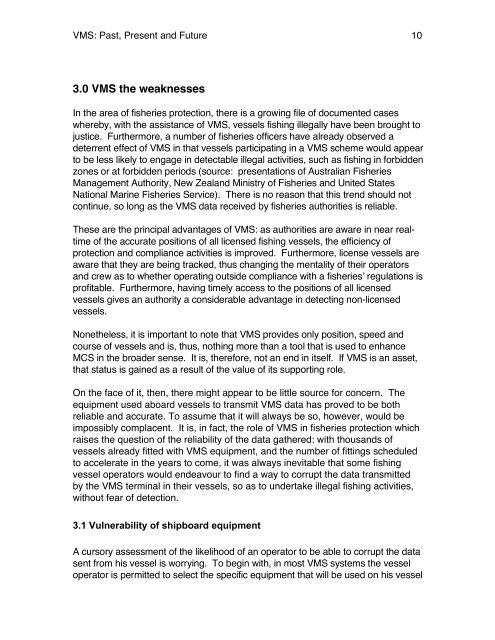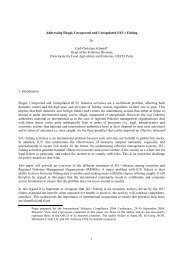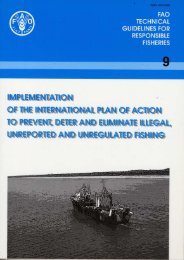Fishing Vessel Monitoring Systems: Past, Present and Future
Fishing Vessel Monitoring Systems: Past, Present and Future
Fishing Vessel Monitoring Systems: Past, Present and Future
You also want an ePaper? Increase the reach of your titles
YUMPU automatically turns print PDFs into web optimized ePapers that Google loves.
VMS: <strong>Past</strong>, <strong>Present</strong> <strong>and</strong> <strong>Future</strong> 10<br />
3.0 VMS the weaknesses<br />
In the area of fisheries protection, there is a growing file of documented cases<br />
whereby, with the assistance of VMS, vessels fishing illegally have been brought to<br />
justice. Furthermore, a number of fisheries officers have already observed a<br />
deterrent effect of VMS in that vessels participating in a VMS scheme would appear<br />
to be less likely to engage in detectable illegal activities, such as fishing in forbidden<br />
zones or at forbidden periods (source: presentations of Australian Fisheries<br />
Management Authority, New Zeal<strong>and</strong> Ministry of Fisheries <strong>and</strong> United States<br />
National Marine Fisheries Service). There is no reason that this trend should not<br />
continue, so long as the VMS data received by fisheries authorities is reliable.<br />
These are the principal advantages of VMS: as authorities are aware in near realtime<br />
of the accurate positions of all licensed fishing vessels, the efficiency of<br />
protection <strong>and</strong> compliance activities is improved. Furthermore, license vessels are<br />
aware that they are being tracked, thus changing the mentality of their operators<br />
<strong>and</strong> crew as to whether operating outside compliance with a fisheries’ regulations is<br />
profitable. Furthermore, having timely access to the positions of all licensed<br />
vessels gives an authority a considerable advantage in detecting non-licensed<br />
vessels.<br />
Nonetheless, it is important to note that VMS provides only position, speed <strong>and</strong><br />
course of vessels <strong>and</strong> is, thus, nothing more than a tool that is used to enhance<br />
MCS in the broader sense. It is, therefore, not an end in itself. If VMS is an asset,<br />
that status is gained as a result of the value of its supporting role.<br />
On the face of it, then, there might appear to be little source for concern. The<br />
equipment used aboard vessels to transmit VMS data has proved to be both<br />
reliable <strong>and</strong> accurate. To assume that it will always be so, however, would be<br />
impossibly complacent. It is, in fact, the role of VMS in fisheries protection which<br />
raises the question of the reliability of the data gathered: with thous<strong>and</strong>s of<br />
vessels already fitted with VMS equipment, <strong>and</strong> the number of fittings scheduled<br />
to accelerate in the years to come, it was always inevitable that some fishing<br />
vessel operators would endeavour to find a way to corrupt the data transmitted<br />
by the VMS terminal in their vessels, so as to undertake illegal fishing activities,<br />
without fear of detection.<br />
3.1 Vulnerability of shipboard equipment<br />
A cursory assessment of the likelihood of an operator to be able to corrupt the data<br />
sent from his vessel is worrying. To begin with, in most VMS systems the vessel<br />
operator is permitted to select the specific equipment that will be used on his vessel

















